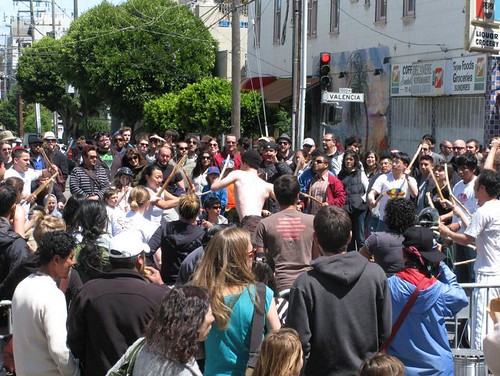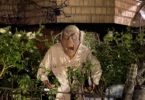Happy Solstice, everyone!
The longest, most sunlight-filled day in the Northern Hemisphere feels like a good occasion to talk about visions. Visions by nature are somewhere in the distance, perhaps reachable, perhaps not. Where we stand right now is the result of past visions, some of them good, some of them bad, much of it in the eye of the beholder. Without vision, however, we stand still. This might be preferable to moving in the direction of blurred or destructive visions, but as change is the only constant in life, the best way to nurture and guide that change is to add our own vision to the grand pool of dreams and ideas.
As I’m looking toward the horizon, I see many things, some of them clearly, others a bit out of focus. I see views that may materialize by taking a couple of firm steps toward them, and others that may take quite a leap of faith. Today, on this solstice, I’m feeling inspired to take a big leap, a step so giant that it has room for a thousand “buts” and “dream ons,” a vision that sounds either too good to be true or too far out to be taken seriously. But what’s reality other than a current condition we all tacitly agree upon, for no other reason than the perception that everyone else acts as if that condition is “normal?”
So here it is, my solstice vision, with visuals and sounds to help look and carry us past the horizon:
What If Music Ruled the World?

Drum and dance circle on Valencia St, photo Debra Baida
Music the Motivator
Nobody likes to be patronized. It’s been the downfall of rulers, leaders, and hierarchies throughout history. Sure, you can threaten and scare people into changing their ways but it’ll be a constant struggle. In fact, people get very creative in defying orders, not necessarily because they disagree with the content of the message, but because nobody likes to be told what to do and how to behave.
If music ruled the world, it would inspire people to do things differently because it’s fun and uplifting, literally…
[youtube http://www.youtube.com/watch?v=2lXh2n0aPyw] from The Fun TheoryMusic the Connector
There’s not much we can achieve by ourselves on this planet, we all depend on each other, not just to survive but to evolve as sentient beings. All too often we get into quarrels because we don’t know each other and judge each other based upon assumptions made in the most lonesome corners of our own minds.
If music ruled the world, it would bring us all together more freely and more deeply…
[youtube http://www.youtube.com/watch?v=Us-TVg40ExM] Stand by Me, from the award-winning documentary, Playing For Change: Peace Through MusicMusic the Peacemaker
Some say that war is just part of the human experience on earth. If that is so, why does everyone keep talking about wanting peace? Even the most entrenched conflicts have a solution, but too often the same unimaginative people are in charge of finding them, with the exact same, stale methods over and over again. What if for just one year we would entrust the peace process in Israel to the musicians of Jerusalem, with negotiations to take place as part of a jam session? Sounds to me like the perfect recipe for taking a giant leap.
If music ruled the world, we would listen more to each other…
[youtube http://www.youtube.com/watch?v=mHglfyQOd2s] video by Kutiman for Jerusalem Season of CultureMusic the Creative Force
Whether it’s politics, business, or public policy, we have a tendency to entrust the least inspiring bureaucrats with the biggest tasks of creating the fundamental changes we all know we need. Albert Einstein famously equated insanity with doing the same thing over and over again and expecting different results. Music is one of those rare forces that liberates our deeply ingrained thought patterns, opening up a deeper reservoir of inspiration we never knew about, whether we’re playing or listening.
If music ruled the world, we would come up with creative solutions to our most pressing issues…
[youtube http://www.youtube.com/watch?v=zj0Bmbjz2qA] Sounds, sights, and sceneries during Cradle Duende’s performance at the 6th Bicycle Music Festival, the largest 100% bicycle-powered music festival in the world, at Old Cabin Meadow in Golden Gate Park.and last but not least,
Music the Teacher
How often do we all find ourselves in situations where we want to make a point or convey a message but nobody is paying attention? How many good ideas have gotten lost or were never expressed because they just didn’t groove enough? Most of the important public policy presentations and speeches by our representatives across the globe go in one ear and out the other because they’re too boring.
If music ruled the world, we would pay more attention to what’s important…
[youtube http://www.youtube.com/watch?v=6nD2tGLJyHY] what price do we pay for all of our distractionsdevices, and gadgets and box office attractions?
it’s a whole culture based on external consumption
hey now everybody, ain’t we missing something?
Use Less, by Mike Ehlers
This is my vision, what’s yours?
Happy Solstice








Gonna be puttin’ feet on this one Sven. Thanks, dear one, for sharing the vision and the dream! Love!
Your boots are made for walking, Glenna, that I know for sure. Love to you across oceans!
This year marks the 50th anniversary of the Philadelphia Folk Festival, the longest-running general interest music festival in the world according to the non-profit organization that runs it (The Philadelphia Folksong Society). http://www.pfs.org/folk-festival
The event is a testament to what you’ve written in many ways. It is an amazing event put on entirely by motivated volunteers. The creativity extends from the stage, into the audience, and across the campground, taking hold of everyone — musicians and non-musicians alike.
The folk festival is the one place where the words out of my mouth don’t fall on deaf ears.
I was a little scared the first time I went because I’d seen pictures of wall-to-wall tents and a sea of people. All that melted away moments after I arrived. Since then, I have yet to see so many people in one place — not only without incident or argument, but with a sincere sense of unity, fellowship and peace.
It’s invigorating to be there. It teaches us that possibilities of your vision are real.
However, there the average attendee is white. I think the lack of diversity might be a product of the misperception of what folk music is. The stage is filled with musicians from all corners. It does raise the point, though, that we don’t share the same musical taste, and that every culture has its own genre that speaks to the heart of its people and their struggles. This is the essence of folk music, but even in a place like PFF where the variety of music is a loved, key component, how do we get the audience to diversify?
Ruth, what a great comment! The Philadelphia Folk Festival sounds awesome and reminds me a bit of Hardly Strictly Bluegrass that takes place every year the first weekend of October in Golden Gate Park.
I think you put your finger on the pulse of the lack of diversity at music festivals. I’ve often wondered why there aren’t more black people at Jazz concerts. It is after all a music style firmly rooted in the African American experience and many of the musicians are black. But it really is about keeping your own identity, and since the very root of blacks’ experience in this country is to have everything taken away from them, it makes sense that music and art can be one of the things that are uniquely yours. Thus, when Jazz became more and more popular among whites, it only made sense to look for new ways to distinguish your own experience in a white-dominated world, and I think hip hop reflects that.
While I personally would love to see more diversity at folk concerts I also understand why they don’t attract too many people of color. If you are black in America, there are just too many things that were hoisted upon you throughout history, so it must feel more comforting and liberating to be part of movements and styles that originated within your own culture. It’s kind of like having your own private room in the house.
So in the end — black, white, red, brown, and purple — everyone should find a way to let the music rule…even if we don’t all come to the same party.
I think that’s it, Ruth. The more we let each other be ourselves, the more we’ll want to be together.
Wish you could send this to every member of the United Nations. Maybe we need a NEW, young-people-only United Nations.
I do not think that walking into a destructive vision is truly a progress.
I don’t think that not moving is without vision.
Where did the futuristic hysteric agitation of reactionary minds lead humanity?
Into more rigid concepts corresponding to their inner mind structures .
I have the feeling that certain society’s are obsessed with the idea of permanent changes and creating pretend new visions, without allowing themselves to take enough time to digest philosophically the effects of the last ones. These pseudo activation makes me think, that without respect for
the energy coming through the roots, some needs lots of artificial leaves to hide a creative dryness.
But dear, that was only my thoughts making few strange sounds in words, who will probably be only heard once after the noises of permanent progress will whisper exhausted.
May those enjoying music and community do it for the sake of it.
How much costs a ticket at all those famous festivals these days?
Yuppie recreation, celebrity band promotion…how palish compared to the rural dance floors and gatherings around travelling musicians. Less equipment, organisation and resources needed too.
To help with your question of cost, the Philadelphia Folk Festival is in the ballpark of $150 for four days of music and camping. I agree we should enjoy music beyond organized events, but part of what makes PFF great is the shear magnitude (so many people enjoying the same party!) and the fact that the organization happens almost completely by volunteers.
Arlo Guthrie (son of Woodie Guthrie) once spoke from the main stage on a topic that really hit home with me. I believe it also addresses your last point. He reminded us that, somewhere along the line, we decided we needed to pay talented professionals to make good music and wound up ceasing to make music of our own. He, and I, believe that we must sing out no matter how good our vocal qualities and stop waiting for stars to entertain us.
In another story, we were once visited by a group of 32 Scottish and Irishmen. They were in Pennsylvania to attend a festival. Staying at various host-family homes around the neighborhood, they liked to come together each night at the local “pub.” There, they sang songs relentlessly. They were a pipe band … not a vocal group. On the last night, they turned to us Americans and said, “why don’t you sing a song?” We all looked at each other bewildered. What song would we all know the words to? We couldn’t come up with much more than the national anthem or “Take me out to ball game.” It was embarrassing and a little pathetic.
Finally, cannot the vision be a “change” back to the past?
Great comments, antiphonsgarden and Ruth. On the issue of change I also think that much of what we call change is just repackaging things that have been done already. For example, the idea that eating local food is something totally new and radical is very strange, since that’s how most humans did it until a very short time ago. On the other hand, if you grew up with and have never seen anything but shopping malls and prepackaged food, the idea of a farmers market can be truly revolutionary, and who am I to take that feeling of discovery away from someone who is searching. It’s maybe a bit like the relationship between adult and child; the adult has experienced life, learned about the world, and knows what works and what doesn’t, and yet there’s a beauty in watching children explore and stumble through life, seeing things for the first time that we’ve long ago formed a consensus on what they mean.
Ultimately though I agree that all the visions, philosophies and new explanations point to the same common origin. In the end all these different expressions and yearnings are manifestations of a universal and never-changing constant that we humans are all looking for meaning, belonging and love in our short journey through life on planet Earth.
Music: Well, as a former touring musician I can tell you that it’s nice to get paid, even just enough to buy a meal or have a roof over your head. Perhaps in an ideal world a musician’s worth would be rewarded just as an accountant’s or a teacher’s. But I also understand the idea that music perhaps shouldn’t be a profession but rather just a spontaneous shared creative expression that brings people together. I have to say though that while I love playing the guitar around a campfire there is something amazing about composing, practicing and putting together a band/orchestra, but that takes a lot more time and effort and ultimately you run up against the issue of having to survive somehow. So I think I’d like to see both: More spontaneous (and perhaps out of tune 😉 singing AND fair compensation for those who’ve dedicated themselves to the art and craft of music on their journey through life.
Thank you Ruth and Sven for your responses.
I just thought of festival’s who assume to be the continuation of a certain spirit, but only those can afford, who have themselves or had parents who have stepped out of that kind of spirit. It is so relaxing to pretend to be a hippie during a weekend, as long it s only about a limited time period and after that what some imagine being a mature real life, goes on.
Sven, I can only repost my hopes for citizen money, who would let emerge a creativity not connected to necessity. But obviously these days, they prefer to
increase the profit of the up nose few….who enjoy probably very select festivals.